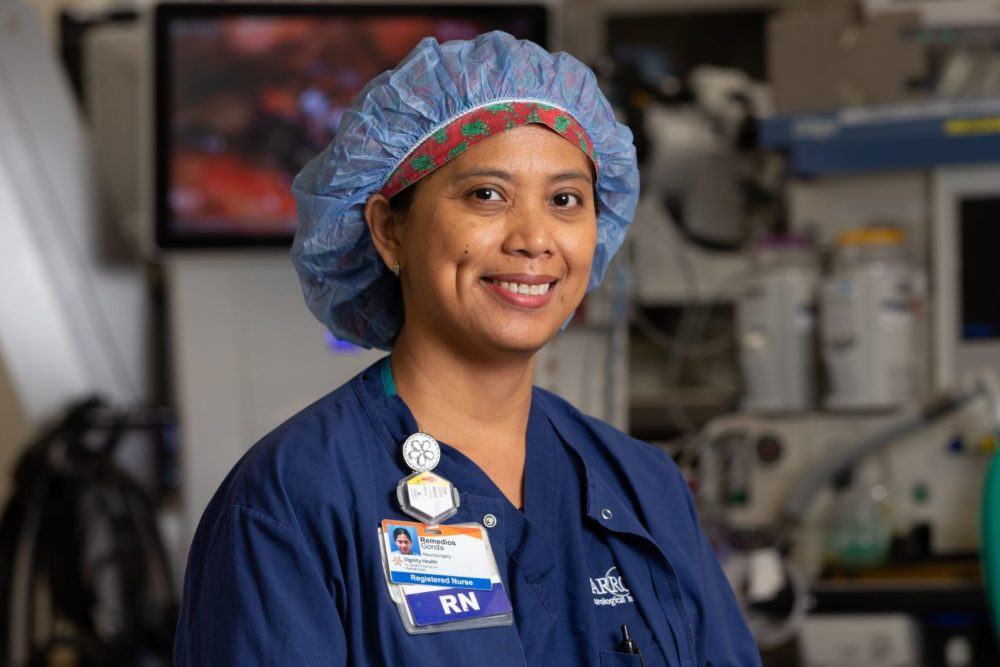
Q&A: Remiel Gonda, Operating Room Nurse
“It’s a beautiful field of nursing,” she said. “The OR team is like a family, and every team member is important and focused on giving excellent care for that one patient.”
Remiel began her career as an OR nurse 26 years ago, first working in the Philippines and then in Saudi Arabia before coming to the United States.
She has worked at Barrow for 15 years, both as a scrub nurse and circulating nurse. She’s also a preceptor, who provides guidance to nursing students and newly employed nurses.
For Neurosurgery Awareness Month, we spoke to Remiel about what it’s like to work as an OR nurse.
What are the main responsibilities of the OR nurse before, during, and after surgery?
Before surgery, I see the patient in the Pre-Operative Center and make sure the history and physical examination have been updated, the surgical site has been marked, and the logs have been completed. Everything has to be done for patient safety, and we have to be knowledgeable about the patient and the case. When I see the patient in Pre-Op for the first time to meet them and their family, I need to secure their trust. Then, I do a pre-op checklist, which includes confirming the patient’s name and date of birth, making sure the patient hasn’t eaten since midnight, and noting any metal implants, dentures, etc. I also need to verify the consent and make sure the patient understands the procedure, addressing any questions or concerns the patient might have.
During surgery, we’re responsible for a lot of things. We have to make sure the room is ready before we bring the patient back. That includes every single thing inside the OR, like the correct operating table, equipment, and implants. The circulating nurse needs to have open communication with the scrub nurse and scrub tech to make sure they have everything they need. The circulating nurse is in charge of the room and keeping the sterile field free from traffic. They also work closely with the anesthesiologist.
After surgery, we take the patient to the post-anesthesia care unit and give the report to the nurses for further care.
How would you describe a typical day?
First, I look at the board of all the cases to see what my assignment is for the day. Then, I go directly to my room and set it up. I have to make sure we have everything we need for the case, and every surgeon has a preference card for every case that I can refer to. Then, I gather any medications needed, write the patient’s information on the white board in the OR, do my pre-operative assessment, and communicate with the anesthesiologist. After the case, I facilitate the room turnover for the next patient.
How many cases might you do each day?
It depends. If I’m doing a big spine case, for example, I might just do one case the entire day. If I’m doing smaller cases, maybe three, four, or five cases a day. On average, I do two to three cases a day.
It’s very rewarding and fulfilling as a nurse to gain trust from the patient and work in an environment where it’s like a family.
-Remiel Gonda, Barrow OR Nurse
What is the most difficult or challenging part of being an OR nurse?
If a person is new in the operating room, it will be very challenging in their first six months or their first year. We work here as a team, and it takes time to gain trust from everyone in the room. Also, we use a lot of surgical supplies and equipment in the OR. Knowing where to get these things can be very hard if you’re new.
Another difficult part is doing emergency cases and being on call. You get called in the middle of the night to do an emergency case, and you have limited resources and help. You’re trying to take the patient back as quickly and safely as possible, and at the same time you’re setting up the room and doing everything else. It can be very challenging and stressful.
What do you love most about being an OR nurse?
I learned how to be more compassionate and thoughtful because patients who go through surgery are usually under stress. Comforting them and giving them assurance by providing the best of care gives me fulfillment. It’s very rewarding and fulfilling as a nurse to have that feeling and to gain trust from the patient and work in an environment where it’s like a family.
What is one of the biggest public misconceptions about your job?
I think most people don’t know about what we do in the OR. They may have watched the Grey’s Anatomy series, but that’s not reality. I think the biggest misconception is that we’re just charting and sitting around when circulating in a case. They may think the surgeon does everything and not realize that everyone inside the room plays a pivotal role in caring for the patient. A surgeon can’t operate without every single one of us. Every person in the OR is important.
What advice do you have for people considering a career as an OR nurse?
You have to be adaptable, hard-working, flexible, and willing to accept challenges. You also have to prioritize patient safety at all times. You have to stand your ground and be the patient’s advocate.
This interview has been edited for brevity and clarity.
